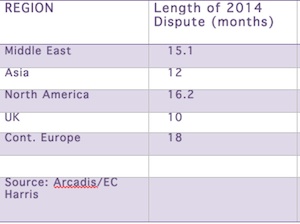
Construction disputes globally are dragging on longer and costing more than ever before, with Asia and the Middle East leading the way, a new report finds.
The average value of a construction dispute worldwide hit $51 million in 2014, up from just under $40 million the year before, while it took on average 13.2 months to resolve, according to a new report by global design and consulting firm Arcadis.
The cause most commonly cited is the “failure to properly administer the contract,” notes the firm’s “Global Construction Dispute Report 2015.”
The rise of major, multi-project infrastructure programs globally is helping drive up the cost of the average dispute, notes Roy Cooper, head of contract solutions/North America for Arcadis.
“Now it’s not one thing going bad on a smaller project, it is one thing going bad on a really big (infrastructure) program with multiple projects,” Cooper said.
The average construction dispute in Asia more than doubled to $85.6 million, though the length dropped to 12 months from 13.
The Middle East was a close second, with the average dispute jumping to $76.7 million, up from just under $41 million, while the number of months rose from just under 14 to just over 15.
The average dispute in Continental Europe hit $38 million, up from $27 million, while the United Kingdom held steady at $27 million.
By contrast, the average construction dispute in North America fell to just under $30 million, down from over $34 million in 2013, even as the amount of time it took to resolve the average dispute pushed past the 16-month mark, up from 13.7 months in 2013.
After failure to properly administer the contract, top causes of disputes, according to Arcadis, were: “poorly drafted or incomplete and unsubstantiated claims; errors and or omissions in the contract document; failure to understand and/ or comply with its contractual obligations by the employer/ contractor/ subcontractor; failure to make interim awards on extensions of time and compensation.”




Post a comment to this article
Report Abusive Comment